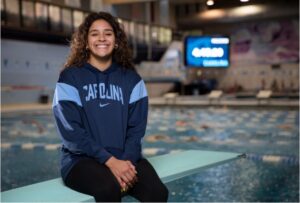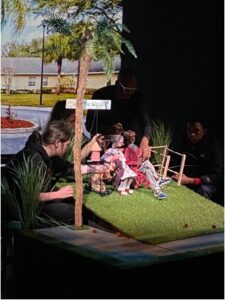
By Ira Wilder
As soon as her head hit the water, Aranza Vazquez knew she’d won the national championship.
She climbed out and waited for her one-meter springboard score — a 358.75, 18 points ahead of her closest opponent — to confirm what she already knew. She couldn’t contain her excitement.
During her post-victory interview, an ESPN reporter asked her: “What did Coach Gamboa say to you after your dive?” Vazquez responded, “Gamboa said ‘I’m so f—ing proud of you.’”
She didn’t realize she’d said that seven-letter word on national television until hours later, but her ecstatic word choice was understandable to those familiar with how she got there.
She is the first UNC diver to win an NCAA title. The very next day, she collected another one on the three-meter springboard.
Leap of faith
Her path to victory was neither linear nor easy. The Olympian diver overcame mental health struggles along the way, rediscovered her love for the sport and prioritized her well-being throughout her most successful season yet.
Vazquez has been competing internationally since she was nine. She was raised in La Paz, Mexico by a family of athletes, though none have ever competed on the same global stage as her and her brother. Her brother, Rodolfo, will join her on the UNC diving team next year.
Growing up, she missed countless weekend hangouts with friends and instead piled in the family car with her brother and parents to drive to competitions everywhere from Colombia to California. She felt natural competing and enjoyed building friendships at competitions with young international divers.
It wasn’t until she was a teenager that she became conscious of her love for the sport.
When she was 16, she had her eyes on competing for Mexico in the 2018 Junior Olympic Games. Though she was successful at the qualifying events, another female Mexican diver was ultimately chosen to compete in the games.
Though she was disappointed, she was soon recruited by UNC Coach Yaidel Gamboa, who was childhood friends with her local coach. Gamboa kept a close eye on Vazquez’s international performances during high school and was impressed by her discipline and humility. He was one of the main reasons she decided to come to UNC.
A Tar Heel triumph
Her passion surged after being recruited. Her dedication paid off, leading her to an Olympic final.
Vazquez finished sixth in the women’s three-meter springboard final at the 2020 Tokyo Olympic Games.
When she returned to Mexico, a massive party welcomed her home. Her family shared cakes and old stories and danced for hours, celebrating her accomplishments across the Pacific.
But the celebration ended. She said she had put years of pressure on herself to reach the Olympic podium, and, when she didn’t, she didn’t know what to do next. She began to experience what she called an “Olympics depression.”
“We athletes, we have our ups and downs and we’re not invincible,” she said.
Under the surface
In an October 2021 Instagram post, she wrote that, during a low point in her diving career, she found it difficult to attend practice regularly and engage in physical conditioning. She was essentially starting over from scratch.
Vazquez is not the only student-athlete who has experienced mental health issues. Approximately 30% of female student-athletes and 25% of male student-athletes reported having anxiety, according to data from the American College of Sports Medicine. In comparison, about 20% of adults experience a mental health condition at some point in their lives.
Anton Down-Jenkins is a junior diver at UNC who also competed in the 2020 Olympics. He is one of her closest teammates and, after placing 8th in the men’s three-meter springboard final, he struggled with depression and impostor syndrome — much like Vazquez.
“We had a dream of ‘We are gonna make the Olympics one day,’ and then that happened all so suddenly, and I think we were both a little bit surprised to have reached the pinnacle of sporting events,” he said.
The young divers were left questioning if they had reached their peaks.
“What do we do now? Like, we’ve kind of done it all?” he said.
Suffering from success
During the 2021-2022 season that followed the games, Vazquez felt even more pressure to perform well at collegiate events. She wasn’t just a ‘good diver’ anymore, now she was an Olympian, and that label carried a weight. She felt unmotivated, as if there was no point in competing if she wouldn’t compete perfectly.
Vazquez did not do as well as she expected to in the 2022 ACC Swimming and Diving Championships, during which her highest placement was third on the three-meter springboard. That continued into the 2022 NCAA Championships, during which her highest placement was third on the one-meter springboard.
Gamboa supported her with mental training and constant encouragement, often reminding her to enjoy the sport more than the outcome.
“Focus on the fun part,” he often said to her.
So, she took a break from diving last summer — no competing, no practicing. She wanted to reset and remind herself why she loves the diving board.
Away from the pool, she missed the sport she’d competed in for the last decade. She was eager to get back in the water, regardless of how many accolades or disappointments it might bring her. Before returning to Chapel Hill, she cleared her mind and made a promise.
“‘If you want to keep doing this, you gotta step up and do great next year and push through,’” she said to herself.
A splashy resurgence
And she did, producing her best collegiate season ever. She went on to sweep gold medals in the one-meter, three-meter and platform competitions at the ACC Championship in February — the first diver to do so since 2008.
In order to perform her best, Vazquez said she had to learn that she didn’t need to win every competition, and she approached this year’s NCAA Championship the same way.
Before she stepped on the board, Gamboa told her: “You don’t need anything special. In order to perform your best, you just need to be you.”
When she stepped on the board for the final time, she didn’t think about corrections, technicalities or perfection. She didn’t think about her dad in the stands calculating how many points she needed to win. She didn’t think about her grandmother beside him fearing for her safety. She treated the dive like one of the thousands she’d done this season in practice.
“Just go,” she said to herself.
When she got out of the water and saw her score, she was surrounded by teammates and Coach Gamboa. Gamboa knew that Vazquez’s time at the NCAAs was a milestone step — not only in her athletic journey — but also in her mental health journey.
She dove without concern for a larger narrative or the expectations of anyone watching, yielding what Gamboa called “a great dive.”
More than a champion
Her national titles are now just a jewel in the crown of a successful season, one in which she set a strong example for her peers. Down-Jenkins said she’s been an unrelenting supporter of her teammates’ mental health and has started open discussions about it, letting her peers know that they’re not alone.
“Me talking about my experiences just helps to create a community, an athlete environment where people feel safe,” Vazquez said.
Gamboa said Vazquez was almost unanimously elected team captain by her fellow divers, exemplifying how much she means to her peers.
“That’s the kind of athlete you really don’t get too often to coach, who have the talent and have the potential to do great things but also have the heart and the mentality to really do what it takes,” he said.
Her go-to three-meter dive is a two-and-a-half gainer, though she has her eyes set on consistently completing a three-and-a-half next year. She hopes the 2023-2024 season will be her best yet as she prepares for the 2024 Olympics Games in Paris.
Until then, she’s just enjoying the sport that she loves so much — rather than focusing on the pressured glory attached to it. She still hasn’t watched the replay of her final dives in the Tokyo Olympics.
“I don’t know why. I do want to see my dives. But, at the same time, I just want to remember them as me doing them,” she said.
Edited by Fleet Wilson and Christian Ciocoiu
